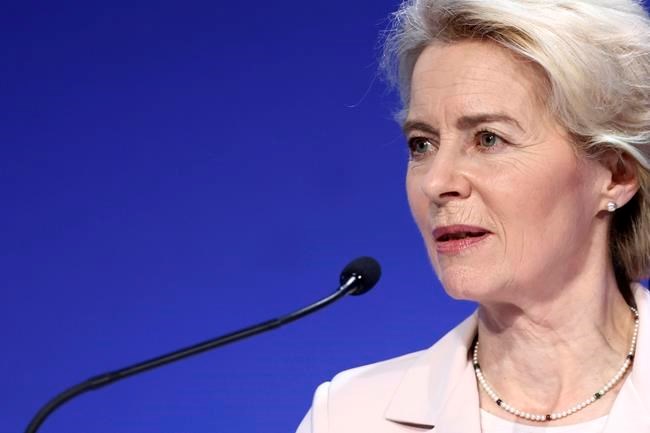BRUSSELS (AP) — European Union countries on Wednesday agreed on a new package of sanctions against Russia for its war against Ukraine aimed at countering sanctions circumvention through third countries and businesses.
The EU had previously imposed 10 rounds of sanctions on Russia since President Vladimir Putin ordered his forces into Ukraine on Feb. 24, 2022. Banks, companies and markets have been hit — even parts of the sensitive energy sector. More than 1,000 officials are subject to asset freezes and travel bans.
Much work in the latest batch of sanctions has involved closing loopholes so that goods vital to Putin’s war effort don't get through via nations that trade with the EU and have maintained a business-as-usual relationship with Moscow.
European Commission President Ursula von der Leyen, the head of the EU's executive arm, said the new package will “deal a further blow to Putin’s war machine with tightened export restrictions, targeting entities supporting the Kremlin.”
“Our anti-circumvention tool will prevent Russia from getting its hands on sanctioned goods,” she added.
It is the first time that plans have been announced to target trade via other countries, apart from sanctions against Iranians alleged to be supplying drones to Russia.
It also prohibits the transit via Russia of products and technologies which might help boost its defense and security sector.
Under the latest package, if the EU sees for example that exports of a certain computer chip increase five-fold to one nation, and then sees that such exports from the country increase by about the same amount to Russia, the bloc would be able to take tougher action to end the practice.
The new package specifically allows the implementation of measures restricting the sale, or export of sensitive dual-use goods and technology to third countries who could then transfer them to Russia. Under the new rules, the EU could exert much more pressure to end the practice than before.
“It does give a big stick with which the EU can say: ‘please don’t do it,’ and then, if it continues we go to restrictive measures,” said an official from an EU nation on condition of anonymity because the rules had yet to be published in the EU's official journal.
The rules cannot be excessively rigid, since the EU does not want to immediately alienate nations.
“We need to look for a balance with nations. When we address their bad behavior, we have to make sure we don't immediately drive them into the arms of Putin,” the official said.
The new package will also target 71 extra persons and 33 entities in relation with the illegal deportation of Ukrainian children to Russia.
Also included is the prohibition to access to ports in the EU by vessels engaged in ship-to-ship transfers when there is a suspicion that a boat is not respecting the ban on importing seaborne Russian crude oil and petroleum products into the bloc.
In addition, the package extends the suspension of the broadcasting licenses in the EU of five Russian media outlets under state control.
Past sanctions have been agreed on in just months — extremely quickly for the EU. But new measures are becoming increasingly hard to endorse as they inflict damage on the economic and political interests of some member countries even as they aim for the Kremlin.
Hungary, for instance, had said earlier this week it wouldn't allow EU measures targeting Russian state nuclear energy company Rosatom, insisting on the importance of nuclear energy for Europe’s security and environmental goals.
Hungary signed new agreements in April to ensure its continued access to Russian energy, a sign of the country’s continuing diplomatic and trade ties with Moscow that have confounded some European leaders amid the war in Ukraine.
___
Follow the AP’s coverage of the war at https://apnews.com/hub/russia-ukraine
Samuel Petrequin, Raf Casert And Lorne Cook, The Associated Press



